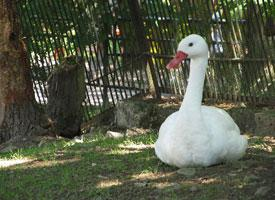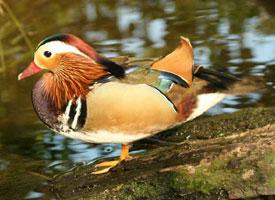
Váhy a míry
| Délka | od 90 do 115 cm |
|---|---|
| Hmotnost | od 3,2 do 5,4 kg |
| Délka rozpětí křídel | 1,57 m |
Biologická data
| Délka života | 20 r |
|---|
Popis zvířete
The Coscoroba swan (Coscoroba coscoroba) is a unique and intriguing species of waterfowl that inhabits the wetlands and freshwater lakes of South America. This species stands out for its distinctive appearance and behaviors, marking its place in the diverse avian world.Physically, the Coscoroba swan is the smallest member of the swan family but larger than most other ducks. Adults typically reach lengths of about 90 to 115 centimeters (35 to 45 inches) and can weigh between 3.5 to 5.4 kilograms (7.7 to 11.9 pounds). They exhibit a striking white plumage that gleams against their aquatic habitats, with the exception of their black-tipped wings which are visible in flight. Their legs, feet, and beak are a vivid pink, adding a splash of color to their otherwise monochrome appearance. The beak is notably small and pointed, contrasting with the larger, more robust beaks of other swan species.
One of the most distinctive features of the Coscoroba swan is its voice. Unlike the more familiar trumpeting of larger swans, the Coscoroba emits a peculiar, high-pitched honking sound, reminiscent of a goose, which is where its name is thought to originate from. This vocalization plays a crucial role in their communication, especially during mating season.
Coscoroba swans are highly sociable creatures, often found in pairs or small family groups, though they can gather in larger flocks during the winter months. They are monogamous, forming long-lasting bonds with their mates. During the breeding season, which varies depending on their geographical location but generally occurs in the spring and summer, these swans build large nests near the water's edge, using vegetation. Females lay between four to seven eggs, which they incubate for about a month while being protected and fed by their mates.
Diet-wise, the Coscoroba swan is omnivorous, feeding on a variety of aquatic plants, small fish, frogs, and invertebrates. They often feed by dabbling at the water's surface or upending, similar to ducks, but will also graze on land.
In terms of habitat, these swans are highly adaptable, residing in a range of wetland environments from large, shallow lakes and lagoons to slow-moving rivers throughout South America. They are primarily found from the southern regions of Brazil and Chile down through Argentina and into the Falkland Islands. Though not considered migratory in the traditional sense, Coscoroba swans may move to warmer areas during the winter to find unfrozen water and more abundant food sources.
Despite facing threats from habitat destruction and pollution, the Coscoroba swan is currently listed as Least Concern by the International Union for Conservation of Nature (IUCN), indicating that it is not at immediate risk of extinction. Conservation efforts continue to ensure that these captivating birds remain a thriving part of their ecosystems for generations to come.
In summary, the Coscoroba swan is a fascinating and beautiful bird, with its distinctive white plumage, pink accents, and unique vocalizations. Its presence enriches the biodiversity of South American wetlands, making it a species of interest not only for ornithologists but for anyone intrigued by the natural world.
Podobná zvířata
Nové fotografie zvířat
Top 10 zvířat
- Diana monkey (Cercopithecus diana)
- Dolphin gull (Leucophaeus scoresbii)
- Galápagos tortoise (Geochelone nigra complex)
- Moustached guenon (Cercopithecus cephus)
- Japanese spider crab (Macrocheira kaempferi)
- Colossal squid (Mesonychoteuthis hamiltoni)
- Fox tapeworm (Echinococcus multilocularis)
- Stone loach (Barbatula barbatula)
- Japanese macaque (Macaca fuscata)
- Barbary macaque (Macaca sylvanus)


